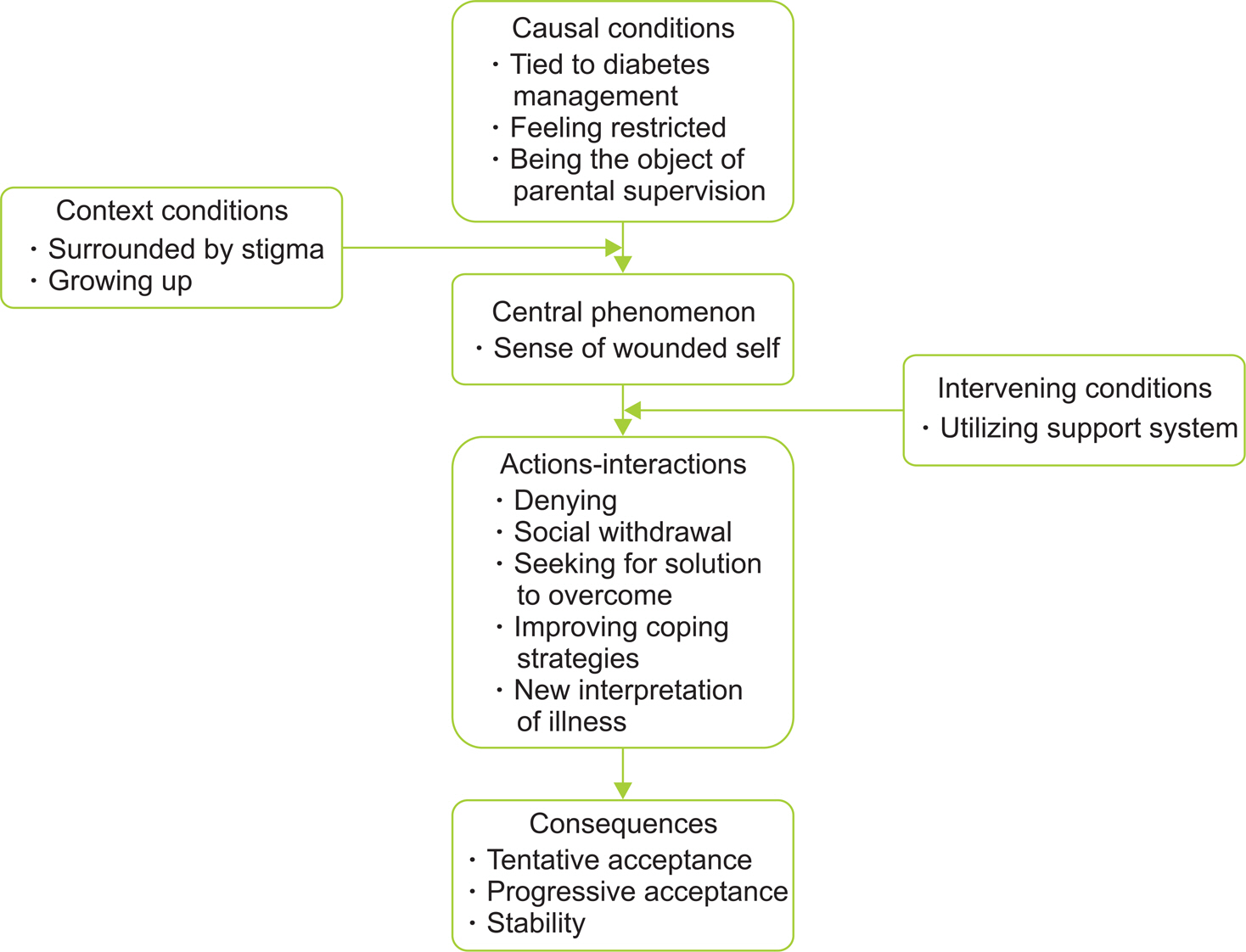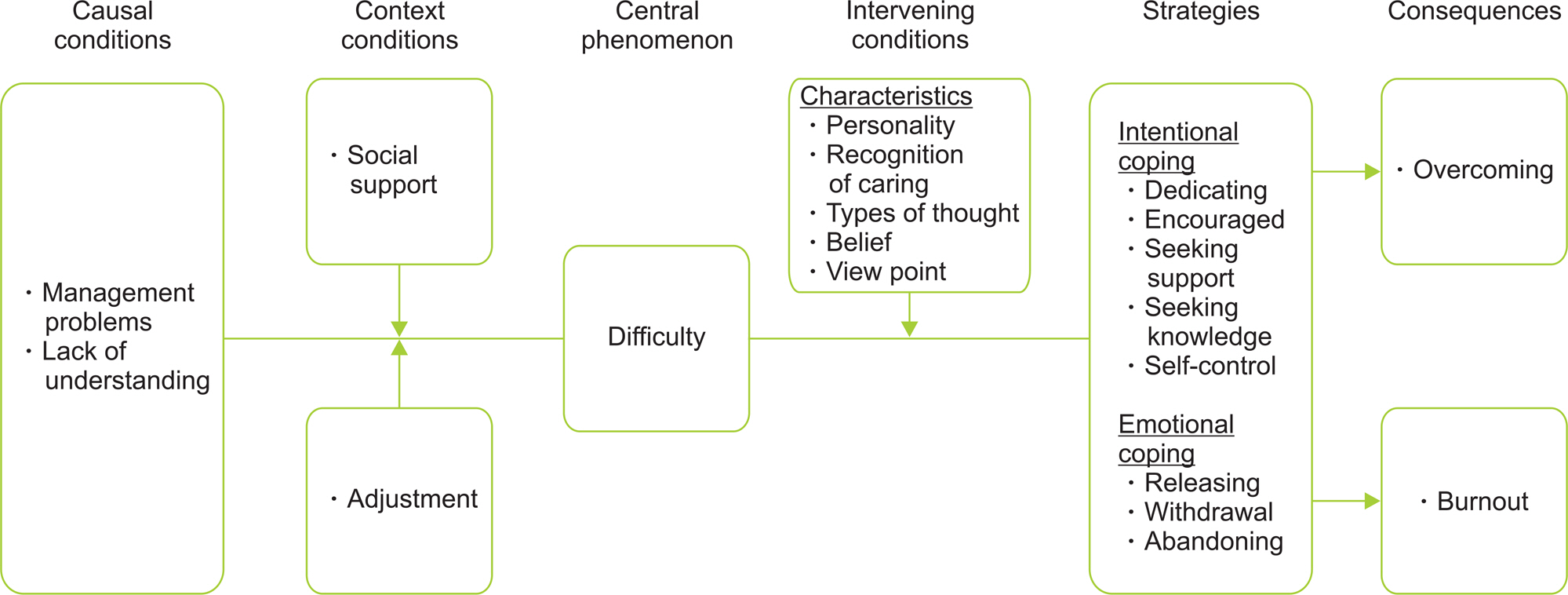J Korean Acad Nurs.
2019 Oct;49(5):505-514. 10.4040/jkan.2019.49.5.505.
Changes in Strauss & Corbin's Grounded Theory
- Affiliations
-
- 1Department of Nursing, Chodang University, Muan, Korea. mattanya@korea.ac.kr
- KMID: 2461851
- DOI: http://doi.org/10.4040/jkan.2019.49.5.505
Abstract
- PURPOSE
This study aimed to introduce and elucidate changes in Strauss and Corbin's grounded theory and discuss its application to the field of nursing in South Korea.
METHODS
The changes in grounded theory by Strauss and Corbin were examined through a literature review of grounded theory from its inception.
RESULTS
Strauss and Corbin acknowledged their philosophical backgrounds of symbolic interactionism and pragmatism; however, their methodology based on positivism overwhelmed their epistemology and ontology. This inconsistency has been represented by the coding paradigm and the premise of "emergent from the data." In the revised version of Basics, Strauss and Corbin modified their theory to weaken the coding paradigm and strengthen the strategies for the development of substantive theory.
CONCLUSION
Strauss and Corbin's revised grounded theory did not fully address the inconsistency of their epistemology and ontology between their acknowledgement and methodology. However, these changes constitute a meaningful step toward resolving inconsistencies and highlight the development of substantive theory. This has implications for Korean nursing researchers who have utilized methodologies in grounded theory with dogmatic approaches; grounded theory, with its evolving nature, is not a finalized method and calls for open approaches for the development of a grounded theory that fits Korean nursing.
Keyword
Figure
Reference
-
References
1. Lee KS. Report on symposium: Grounded theoretical approach in nursing research. The Journal of Nurses Academic Society. 1987; 17(2):105–109. https://doi.org/10.4040/jnas.1987.17.2.105.2. Hewitt JP, Shulman D. Self and society: A symbolic interactionist social psychology. 11th ed. Boston (MA): Allyn & Bacon;2011. p. 147–149.3. Morse JM. Situating grounded theory within qualitative inquiry. Schreiber RS, Stern PN, editors. Using Grounded Theory in Nursing. New York: Springer Pub. Co.;2001. p. 1–16.4. Glaser BG, Strauss AL. Awareness of dying. Chicago (IL): Aldine;1965. p. 1–262.5. Glaser BG, Strauss AL. Awareness contexts and social interaction. American Sociological Review. 1964; 29(5):669–679. https://doi.org/10.2307/2091417.
Article6. Charmaz K. Constructing grounded theory. 2nd ed. London: Sage;2013. p. 1–208.7. Morse JM, Stern PN, Corbin JM, Bowers B, Charmaz K, Clarke AE. Developing grounded theory: The second generation. Walnut Creek (CA): Left Coast;2009. p. xiii–xvi.8. Charmaz K. Shifting the grounds: Constructivist grounded theory methods. Morse JM, Stern PN, Corbin JM, Bowers B, Charmaz K, Clarke AE, editors. Developing Grounded Theory: The Second Generation. Walnut Creek (CA): Left Coast;2009. p. 127–193.9. Corbin JM, Strauss AL. Basics of qualitative research: Techniques and procedures for developing grounded theory. 3rd ed. Thousand Oaks (CA): Sage;2008. p. 1–379.10. Corbin JM, Strauss AL. Basics of qualitative research: Techniques and procedures for developing grounded theory. 4th ed. Los Angeles (CA): Sage;2015. p. 1–431.11. Mills J, Bonner A, Francis K. Adopting a constructivist approach to grounded theory: Implications for research design. International Journal of Nursing Practice. 2006; 12(1):8–13. https://doi.org/10.1111/j.1440-172x.2006.00543.x.
Article12. Lee YC. Reflecting on the grounds for grounded theory: Methodology and methods. Korean Policy Sciences Review. 2014; 18(1):187–214.13. Kim E. A study of grounded theory research in Korean sociology: Trends, limits and implications. Korean Journal of Sociology. 2017; 51(3):37–70. https://doi.org/10.21562/kjs.2017.08.51.3.37.14. Kim IS. Divergence of grounded theory: Focused on the differences of Glaser and Strauss. Korean Journal of Social Welfare Studies. 2011; 42(2):351–379. https://doi.org/10.16999/kasws.2011.42.2.351.15. Suddaby R. From the editors: What grounded theory is not. Academy of Management Journal. 2006; 49(4):633–642. https://doi.org/10.5465/amj.2006.22083020.
Article16. Ellis D. Modeling the information-seeking patterns of academic researchers: A grounded theory approach. The Library Quarterly. 1993; 63(4):469–486. https://doi.org/10.1086/602622.
Article17. Strauss AL. Qualitative analysis for social scientists. Cambridge: Cambridge University Press;1987. p. 6–34.18. Son HM. Research trend analysis on grounded theory in South Korea. Korean Association for Qualitative Research. Korean Association for Qualitative Research Journal Papers. Proceedings of the 2009 Korean Association for Qualitative Research Conference; 2009 Nov 28; Korean Association for Qualitative Research, Seoul, Korea. Seoul (Korea): Korean Association for Qualitative Research;2009. p. 29–34.19. Creswell JW. Educational research: Planning, conducting, and evaluating quantitative and qualitative research. 3rd ed. Upper Saddle River (NJ): Pearson;2008. p. 1–670.20. Kim JE. The illness experience of adolescents with type 1 diabetes [dissertation]. Seoul: Korea University;2018. p. 1–171.21. Creswell JW, Brown ML. How chairpersons enhance faculty research: A grounded theory study. The Review of Higher Education. 1992; 16(1):41–62. https://doi.org/10.1353/rhe.1992.0002.
Article22. Mastera G. The process of revising general education curricula in three private baccalaureate colleges: A grounded theory study [dissertation]. Nebraska: University of Nebraska;1996. p. 1–302.23. Choe MH. Caring experience of the mothers with insulin-dependent diabetes mellitus children. Korean Academy of Child Health Nursing. Korean Academy of Child Health Nursing: Journal Papers. Proceedings of the 1996 Korean Academy of Child Health Nursing Conference; 1996 Dec 12; Korean Academy of Child Health Nursing, Seoul, Korea. Seoul (Korea): Korean Academy of Child Health Nursing;1996. p. 115–136.24. Goulding C. Grounded theory: A practical guide for management, business and market researchers. London: Sage;2002. p. 113–123.25. Glaser BG. The impact of symbolic interaction on grounded theory. Grounded Theory Review. 2005; 4(2):1–22.26. Glaser BG. Basics of grounded theory analysis: Emergence vs forcing. Mill Valley (CA): Sociology Press;1992. p. 1–128.27. Melia KM. Rediscovering glaser. Qualitative Health Research. 1996; 6(3):368–378. https://doi.org/10.1177/104973239600600305.
Article28. Bryant A, Charmaz K. Grounded theory in historical perspective: An epistemological account. Bryant A, Charmaz K, editors. The Sage Handbook of Grounded Theory. Thousand Oaks (CA): Sage;2007. p. 31–57.
Article29. Park JE, Lee BS. Experience of becoming a father of a high risk premature infant. Journal of Korean Academy of Nursing. 2017; 47(2):277–288. https://doi.org/10.4040/jkan.2017.47.2.277.
Article30. Kim SS. Theory: Grounded theory. Korean Journal of Nursing Query. 2003; 12(1):69–81.31. Choe KS. Original articles: Grounded theory methodology - Strauss’ version vs Glaserian version -. Journal of Ko- rean Academy of Psychiatric and Mental Health Nursing. 2005; 14(1):82–90.32. Kwon HW, Choi DL. Understanding the theorization logic of the grounded theory method: Focused on decontextualization and methodological bias of public administration in Korea. Korean Public Administration Review. 2011; 45(1):275–302.33. Kwon HW. Understanding grounded theory. Korean Policy Sciences Review. 2016; 20(2):181–216.34. Morse JM. Tussles, tensions, and resolutions. Morse JM, Stern PN, Corbin JM, Bowers B, Charmaz K, Clarke AE, editors. Developing Grounded Theory: The Second Generation. Walnut Creek (CA): Left Coast;2009. p. 13–23.35. Strauss AL, Corbin JM. Basics of qualitative research: Grounded theory procedures and techniques. Newbury Park (CA): Sage Publications;1990. p. 1–170.36. Glaser BG, Strauss AL. The discovery of grounded theory: Strategies for qualitative research. New York: Aldine de Gruyter;1967. p. 1–271.37. Strauss AL, Corbin JM. Basics of qualitative research: Techniques and procedures for developing grounded theory. 2nd ed. Thousand Oaks (CA): Sage;1998. p. 1–312.38. Clarke AE. From grounded theory to situational analysis. What’s new? Why? How? Morse JM, Stern PN, Corbin JM, Bowers B, Charmaz K, Clarke AE, editors. Developing Grounded Theory: The Second Generation. Walnut Creek (CA): Left Coast;2009. p. 194–235.39. Glaser BG. Theoretical sensitivity: Advances in the methodology of grounded theory. Mill Valley (CA): The Sociology Press;1978. p. 1–164.40. Strauss AL, Corbin JM. Grounded theory methodology: An overview. Denzin NK, Lincoln YS, editors. Handbook of Qualitative Research. Thousand Oaks (CA): Sage;1994. p. 273–285.41. Milliken PJ, Schreiber RS. Can you “do” grounded theory without symbolic interactionism? Schreiber RS, Stern PN, editors. Using Grounded Theory in Nursing. New York: Springer;2001. p. 177–190.42. Charmaz K. The search for meanings - grounded theory. Smith JA, Harré R, van Langenhove L, editors. Rethinking Methods in Psychology. London: Sage;1996. p. 27–49.43. MacDonald M. Finding a critical perspective in grounded theory. Schreiber RS, Stern PN, editors. Using Grounded Theory in Nursing. New York: Springer Pub. Co.;2001. p. 113–158.44. McCann TV, Clark E. Grounded theory in nursing research: Part 2 – critique. Nurse Researcher. 2004; 11(2):19–28. https://doi.org/10.7748/nr2004.01.11.2.19.c5919.
Article45. Birks M, Mills JE. Grounded theory: A practical guide. 2nd ed. London: Sage;2015. p. 1–198.46. Corbin JM, Strauss AL. Grounded theory research: Procedures, canons, and evaluative criteria. Qualitative Sociology. 1990; 13(1):3–21.
Article47. Corbin JM. Taking an analytic journey. Morse JM, Stern PN, Corbin JM, Bowers B, Charmaz K, Clarke AE, editors. Developing Grounded Theory: The Second Generation. Walnut Creek (CA): Left Coast;2009. p. 35–54.48. Schreiber RS. The “how to” of grounded theory: Avoiding the pitfalls. Schreiber RS, Stern PN, editors. Using Grounded Theory in Nursing. New York: Springer Pub. Co.;2001. p. 55–84.49. Reichertz J. Abduction: The logic of discovery of grounded theory. Bryant A, Charmaz K, editors. The Sage Handbook of Grounded Theory. Thousand Oaks (CA): Sage;2007. p. 214–228.
Article50. Goffman E. Stigma: Notes on the management of spoiled identity. New York: Simon & Schuster;1986. p. 1–147.
- Full Text Links
- Actions
-
Cited
- CITED
-
- Close
- Share
- Similar articles
-
- Experience in Nausea and Vomiting of Pregnancy(NVP) in Woman: Grounded Theory Approach
- Countertransference Experience of Nursing Students in Psychiatric Nursing Practice
- A Study on the Experience of Depression in Elderly Women Living Alone
- A Grounded Theory Study on Women's Menopause Experiences
- Parenting Experience of Prematurity Parents Based on Grounded Theory



